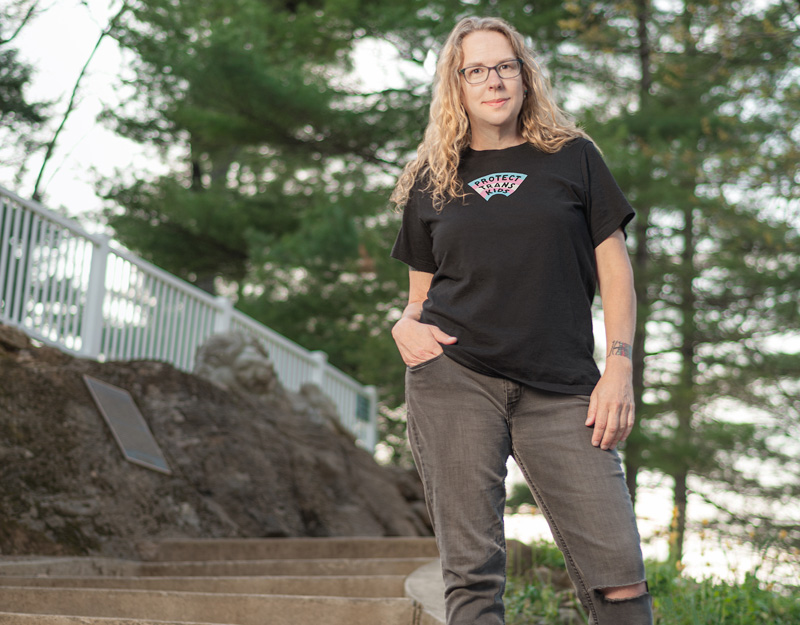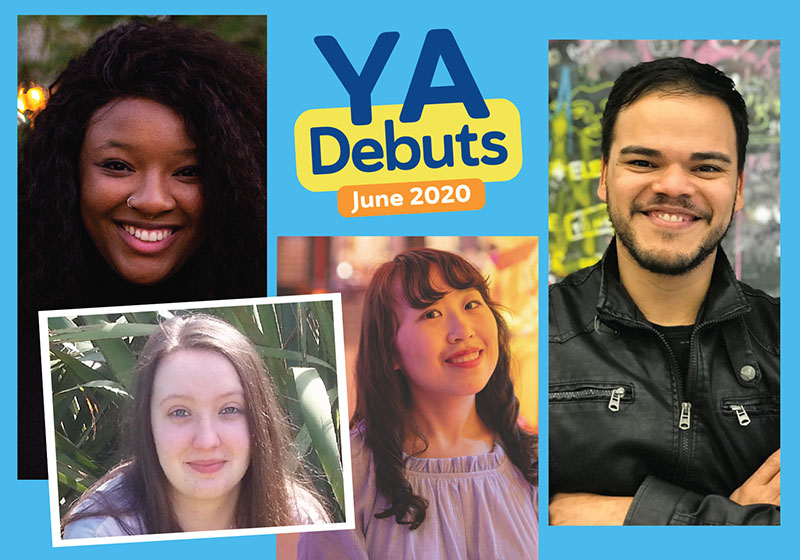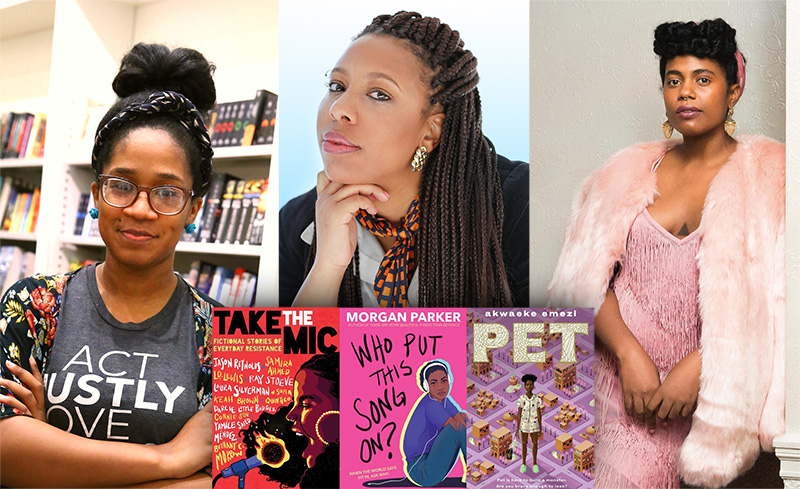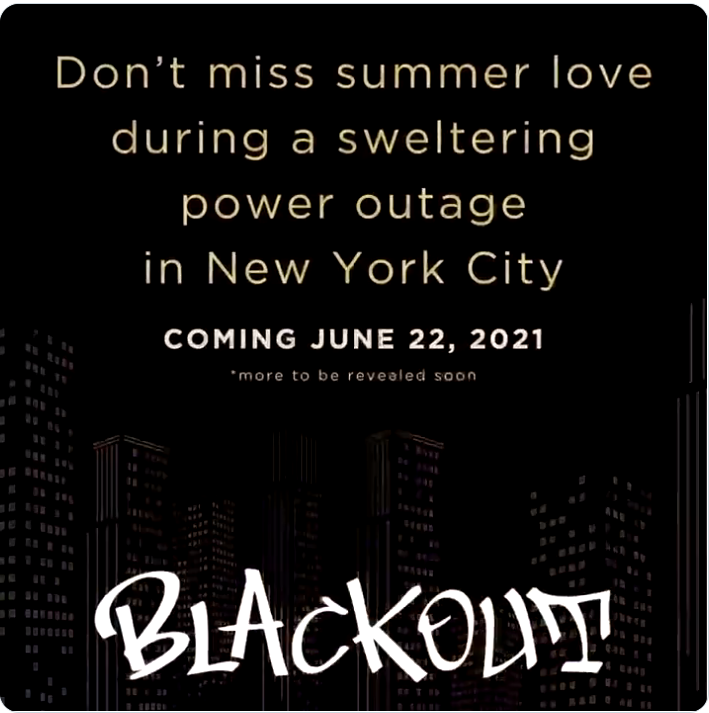#SVYALit Panel #3 Wrap Up: Brandy Colbert (POINTE), Courtney C. Stevens (FAKING NORMAL), Carrie Mesrobian (SEX & VIOLENCE) and Christa Desir (FAULT LINE)
#SVAYLit Project Google+ Hangout on Air with the author Brandy Colbert (POINTE), Courtney C. Stevens (FAKING NORMAL), Carrie Mesrobian (SEX & VIOLENCE) and moderated by Christa Desir (FAULT LINE). This is our third discussion as part of the #SVYALit Project, with an emphasis on the topic of consent, an issue that plays a very meaningful role in both POINTE and FAKING NORMAL. Below are some of the highlights that I have pulled out of the above recording of this virtual panel. I highly recommend that you watch the entire 1 hour video because it was a really powerful, thoughtful discussion that covered on topics like consent, blaming the victim and how we can reframe that, how girls are often taught by culture that they can’t say no, and the importance of having a wide variety of stories to represent the wide variety of experiences and responses out there. We also touch several times on how important it is to have positive stories/examples to help counteract the negative because in order for teens developing their sexual identities to develop healthy sexual identities, they have to know what both positive and negative experiences look like. It’s not enough to tell ourselves that no means no, we need to have examples and discussions of what yes looks like as well.
INTRODUCTIONS:
POINTE: Came out in April. 17 year old ballet dancer named Theo. Her best friend returns after having been kidnapped 4 years ago. This return creates a spiral of emotion as Theo realizes the truth of a lot of situations in her life.
FAKING NORMAL: Alexie and Bodie are both dealing with tragic circumstances. Through their relationship Alexie begins to face the truth of some sexual trauma in her past.
DISCUSSION OF CONSENT (starts at 4:03)
Christa is a Rape Victim Advocate, which frames her perspective. When she presents at schools there is always a lot of confusion about what rape is and what it is isn’t. The legal definition includes a note about “Conscious Consent”. This is the ICASA (Illinois Coalition Against Sexual Assault) that Christa references: http://www.icasa.org/home.aspx?PageID=500&.
Courtney C. Stevens (6:27) – It seems confusing because there seems to be a lot of gray areas. These three things are important:
1. Being of sound mind in some kind of way.
2. Mutual desire
3. Expressed mutual desire
Brandy (7:04) – Discussion in particular of the older person/teen person and the power dynamics that can come into play here. Both people need to be able to talk about it. This is a huge part of Theo’s story in POINTE.
Carrie Mesrobian: (10:00) – Discussing age of consent laws. Teens have a perception of themselves as grown up, they don’t realize they need protection. “You don’t realize the danger you could be in.” “I didn’t know what I should be afraid of.”
Theo was so concerned about being perceived as grown up and the man really grooms her very well, tapping into this need/desire. (11:25)
LOOKING THROUGH THE LENS OF A SURVIVOR (11:30)
Things some survivors think:
“This is all I’m worth”
Every survivor has a unique experience, no one reacts the same.
(12:30) – By not having an empowered voice you are not consenting.
Courtney:
The first thing women do is blame themselves. “I’m the one who didn’t say no.”
(13:00) IT”S ABOUT PEOPLE MAKING A CHOICE TO HURT SOMEONE. GO BACK TO THE RIGHT MOMENT AND ASK THE RIGHT QUESTION
You keep working things out over a period time. You go back to the moment and think, “I could have done something.” But the truth is, you are going back to the wrong moment. But what about that moment when that guy decided he was going to do this to you.” We must continually shift it back to the wrong choice the person made to hurt someone, and it is a conscious choice.
(14:00) EXAMPLES OF OTHER WAYS WE ENGAGE IN VICTIM BLAMING
In domestic violence situations we tend to ask, why does she stay. What we should be asking is why does he abuse. (Or vice versa as the case may be.)
(16:00) EXAMINING ONE’S SEXUAL INVENTORY
Teens don’t always know why they are doing the things they are doing. It’s kind of baked into our culture that we don’t talk about why we do the things we do when it comes to sex. We don’t have a good cultural vocabulary or discussion to discuss the core foundation of why and how we have sex, so then when things go wrong we don’t have the core foundation to talk about that either.
(18:00) HALF THE CONVERSATION IS UNDERSTANDING OURSELVES AS SEXUAL BEINGS
So many times we don’t take the time to think about who we are and what we are okay with – and not okay with. We don’t know how to express ourselves sexually because it is such a taboo subject. Teens are asking these questions inside but no one wants to help them find healthy, realistic answers.
(18:40) TALKING ABOUT A SCENE IN POINTE
Brandy: “It was really important for me for Theo to have a positive sexual experience.” Brandy wanted to show the difference between the earlier abusive situation and this positive experience.
Karen’s thoughts: One of the great things about POINTE is how Theo begins to slowly realize the truth about her previous relationship. She doesn’t initially realize how much it had tainted her self-perception and what she felt like she was worth. The positive scene is a game changing moment that helps her clarify so many things.
(21:00) COURTNEY TALKS ABOUT PEOPLE BEING EASY TO MANIPULATE OR NOT
Teen: “How do I say No to alcohol?”
Courtney: “You’re going to need that word No for a lot of things. . . You get to say No to the things that you don’t want. People are born with a Yes in their pocket, they always say yes.”
ADVERTISEMENT
ADVERTISEMENT
Kissing scene in Faking Normal: A yes to this kiss was just as powerful as a yes to sex. She needed to be able to say Yes. Karen’s note: This is such am empowering scene.
But the truth is . . . Many people are taught not to say no, they are never empowered to say No. This can be more true for women. Carrie talks about this at 23:00. But girls who say no are taught they are being snotty or mean or called a “Bitch.” Being able to say No is “rinsed out of girls at an early age.”
(24:00) “Can I do this?” – asking this question instead of just assuming you can swoop in and do this.”
(25:00) MORE ABOUT CONSCIOUS CONSENT
What part does alcohol and drugs play a part? Alcohol and drugs can impact one’s ability to make good decisions consenting to sex.
(26:00) MORE DISCUSSION ABOUT BEING SOCIALIZED TO BE NICE WHEN SAYING NO
We feel like we have to add in a bunch of stuff to soften the blow when we say no, we don’t own our no. Teens needs to no that they have a right to say to all intimate encounters, even as Courtney mentions in kissing.
(28:00) WE”RE STARTING DIALOGUES ALL OVER THE PLACE
Courtney (29:00): Anytime there is victimology there is no such thing as canon work. Everyone’s experience is different, their reaction is different. Your story can be the story that they connect with. All books represent part of the spectrum of experience. Some people do add it as a plot device, and I’m not for that. But I think authentic experience matters to people. I want the opportunity to make a difference. “Every time a reader says this mattered to me, I’m becoming who I am supposed to be.”
Brandy (31:00): POINTE came in part because she thought about her experiences with older men when she was a teen and wondered, “what would happen if one of them pretended they were younger then they were”. You can tell the authenticity as opposed to when something is added for shock value or a plot device.
Christa (32:45): When people start talking about their history, so many people – men and women – can find situations when they were vulnerable. “Dodgy things have become normalized to us.” References Maureen Johnson blog post about the things that have happened to her (http://maureenjohnsonbooks.tumblr.com/post/79687199694/about-the-recent-events-concerning-youtube ). I also wrote a post about this (https://www.teenlibrariantoolbox.com/2012/12/what-its-like-for-girl-politics-of.html).
Every story is different in terms of what people have been exposed to and their level of vulnerability. These books speak to the shared history of a lot survivors.
ADVERTISEMENT
ADVERTISEMENT
Carrie (35:00): Talking to someone from Fluxx. “Do we still need coming out stories?” Yes, because that is always something that it going to be difficult for families to process and there are so many variables. People are starting to come out about their sexual abuse stories. We’ve been asked for so many years to not saying anything, to hold the shame of the culture of our shame inside of us. That does nothing good for women – women being a majority of the victims of sexual violence. We need a variety of stories because you never know what experience is going to reach out to someone. Some people will see themselves. We need more of that in YA. And we need more in general people wrestling with sex, what is good sex, because we can’t unpack what goes wrong about sex if we can’t talk about what goes right with sex.
Carrie (38:00): Tells the story of being with a boy who knew what he wanted and what an impression that made on her.
Christa (40:00): Tells a story about RT convention. There are a lot of people who will not take a book that has sex in it.
Brandy (41:00): Talking about sex in YA. As a teen, most of us read a lot of Danielle Steel, which of course has a lot of sex in them. When people are uncomfortable with the content of a book they tend to put it down. We need literature that tackles these subjects because we don’t always know what people around us are going through.
Courtney (43:00): The reality is that kids can just put down a YA book and go to the adult shelf and buy an adult book. But the other side is that parents care about their kids. We want responsible, but we also want responsible kids.
Christa (45:00): I absolutely think parents can and should censor things for their kids, but not for my kids. I always start with, let’s have a conversation about this book.
Carrie (46:00): Everyone has sex and violence inside them. Reading helps us navigate that.
Karen (48:00): Here I discuss watching the show The Big Bang Theory with my pre-teen daughter. Whenever it became obvious that sex was going to come up, I would quickly change the channel. This made her have some confusing notion of what sex was – she thought kissing was sex – and she sensed my unease about the topic of sex and started to feel like it was a shameful topic. So I sat down and had a conversation with her where I told her that kissing is not sex, and there is nothing wrong or bad about sex, it just wasn’t something that kids really needed to be concerned with because they needed to be doing kid things. This made me realize how it important it was for kids and teens to have accurate information free of stigma and shame. We can’t ask teens to make informed choices about sex if they don’t fully understand what sex is and it isn’t. And we can’t expect them to develop into healthy sexual beings if we are constantly putting so much shame on the topic. You can talk to teens in informative ways about sex and that does not mean that they will decide to have sex. For example, most of us believe in educating our kids about drugs so they are not caught unawares, it seems like we should be doing the same about all important life issues, including sex.
Christa (49:00): When we build a culture of shame around sex we also are building a culture of shame where survivors can’t come forward. All the silence can be unhealthy. Sometimes in trying to protect our kids, we are making them easier to not be protect-able. I would rather have it in books where we can have a dialogue about it and present clear moments of consent so that they can understand what that looks like.
Courtney (53:00): The girl came to me and I just knew that girl has a story and I need to know what that story is. Teenagers need mentors and they need adults, they need people who believe in them and will genuinely listen to them.
Brandy (55:00): Discusses CRACKED UP TO BE by Courtney Summers. This is when she realized you can cover difficult subjects in YA books.
56:00 EVERYONE SHARES THEIR FAVORITE YA CONSENT SCENES
Christa: The Play Me scene in IF I STAY by Gayle Forman. Everything gorgeous, everything we would all want in our first time scene. Beautifully done. Sexy but not gross. You can also see Christa’s previous list here: http://christaramblesandwrites.blogspot.com/2014/03/consent-and-sensitivity-good-sex-in-ya.html
Carrie: Everty time you see a good sex scene with good consent, put something up on your Tumblr. If it is real and there is good consent, honor that by giving it some love online. You can also see Carrie’s previous list here: http://carriemesrobian.com/2014/03/sexconsent-positive-ya-books-the-svyalit-project/
1) FREE FALL by Mindi Scott – told from a boy’s point of view; funny and vulnerable and real and there is information there about the steps involved
2) NOT THAT KIND OF GIRL by Siobhan Vivian – demonstrates negotiation
Brandy: USES FOR BOY by Erica Lorraine Scheidt – I was completely blown away; it was so moving, what the character needed.
Courtney C. Stevens:
1) THE FAULT IN OUR STARS by John Green – really, really sweet. Didn’t expect the book to go there.
2) FIRE by Kristen Cashore – very realistic, very beautiful
3) IF I STAY by Gayle Forman
Karen:
1) INFINITY GLASS by Myra McEntire – “So do I have a green light?”
2) PLUS ONE by Elizabeth Fama – he checks in half way through like
3) THIS SIDE OF SALVATION by Jeri Smith-Ready
You can also see Karen’s previous list here: https://www.teenlibrariantoolbox.com/2014/03/take-5-sexconsent-positive-books.html
Karen’s Final Note About the Power Dynamics of the Age of Consent:
Several times the discussion of power dynamics in a relationship came up, which are important parts of both POINTE and FAKING NORMAL. And these get into the idea of the age of consent. This topic actually came up recently in a conversation I had with my Tween daughter. I was talking to her about power issues in relationships. I don’t know how it came up, but she asks a lot of questions lately, which is obviously age appropriate and not surprising. But I started to tell her this story about how when I was a Sophomore in high school I started dating a young man in College. He was definitely breaking age of consent laws. One night we had plans to go play miniature golf. I got in his car and he drove right past the golf place to his apartment. Wanting to think the best, I went to his apartment with him. Luckily, as things started to progress he stopped when I told him to. But the truth is, in the moment I was incredibly vulnerable. No one knew where I was. He had all the power; he was physically stronger, older and more experienced, and if he had really wanted to he could have already had a weapon or drugs or some such ready. Thankfully, he was not that guy. But he could have been. I thought not just about power, but about situational differences between teens and adults. It’s one thing when you are a 15 year old dating a 15 year old and you are both trying to find some place to make out and there just really aren’t any and your both fumbling around trying to figure out how to even kiss or whatever. It’s much different when all the sudden you are with an adult who has their own private space – an apartment or a house – and now there is a whole different dynamic going on. That adult doesn’t have to worry about a sibling or parent walking in on you in the car or basement. It’s seems like already the rules are different because the situational dynamics are different, if that makes sense.
Talking with Teens About Consent
Sexual Assault Awareness Month, talking to teens about consent and rape part 1 and part 2
This is What Consent Looks Like
The Curios Case of the Kissing Doctor and Consent
The Healthy Sex Talk: Teaching Kids Consent, Ages 1-21 (the Good Men Project)
Why Talking with Teens About the Age of Consent Matters
On Teachable Moments and Consent
Recaps and Video of the First 2 Discussion Panels:
Recap and Video of the first panel discussing Faultline, Sex & Violence and Where the Stars Still Shine
Recap and Video of the second panel discussing Charm & Strange, Canary, and The Gospel of Winter
See Complete Project Outline and Details Here
Filed under: #SVYALit Project, Brandy Colbert, Carrie Mesrobian, Christa Desir, Courtney C. Stevens, Faking Normal, Pointe
About Karen Jensen, MLS
Karen Jensen has been a Teen Services Librarian for almost 30 years. She created TLT in 2011 and is the co-editor of The Whole Library Handbook: Teen Services with Heather Booth (ALA Editions, 2014).
ADVERTISEMENT
ADVERTISEMENT
SLJ Blog Network
Name That LEGO Book Cover! (#53)
Cover Reveal and Q&A: The One and Only Googoosh with Azadeh Westergaard
K is in Trouble | Review
Fighting Public School Book Bans with the Civil Rights Act
ADVERTISEMENT








Great discussion, everyone! I really enjoyed watching, and I'm so glad you posted the recap, since I couldn't watch live.
Btw, another great book for enthusiastic/positive consent: EASY by Tamara Webber. It's more New Adult than Young Adult, but it would certainly be accessible and interesting to more mature readers, and it shows how consent can be not only a good thing, but a SEXY thing. 😉